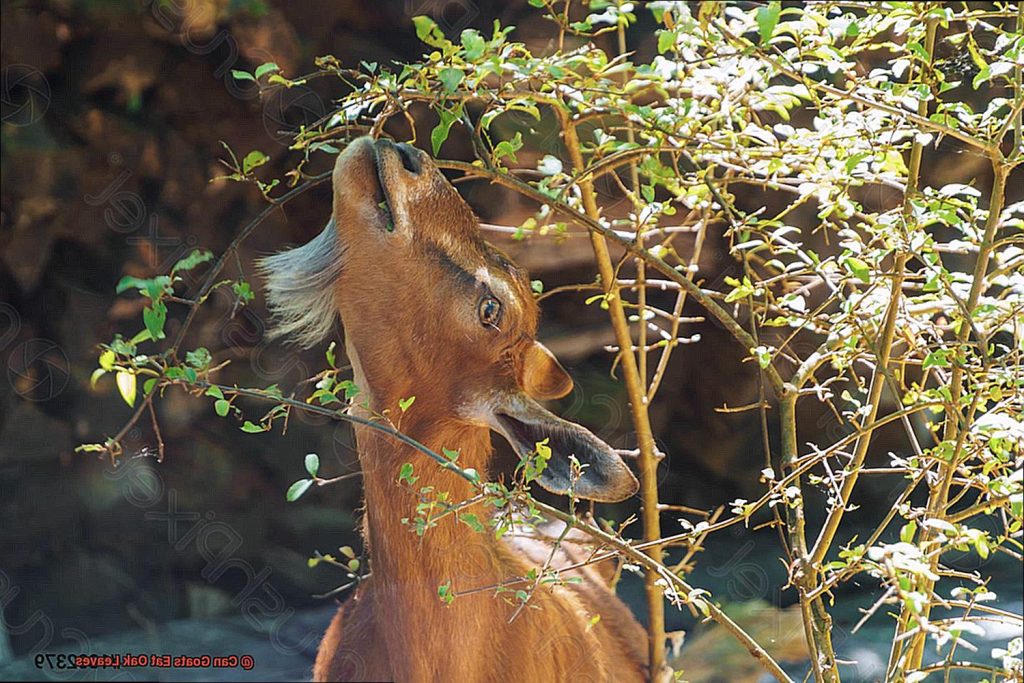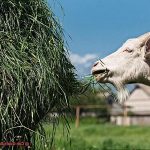Do goats have an insatiable appetite for anything and everything in their reach? While they are less picky than other livestock animals, goats still have some dietary restrictions to keep in mind. So, can goats eat oak leaves?
Oak trees are a staple in many areas of the country, and their leaves are plentiful. However, the answer is not straightforward. Oak leaves contain tannins, which can be toxic in high amounts. But interestingly enough, goats have been spotted nibbling on oak leaves with no apparent ill effects.
In this blog post, we’ll delve into the world of goats and oak leaves. We’ll explore the potential risks and benefits of letting goats munch on these leaves and offer some tips for keeping your furry friends safe and healthy. Whether you’re a seasoned goat owner or considering adding these quirky animals to your homestead, this post is a must-read for anyone with a curious mind.
So let’s take a closer look at why some goats may be able to handle oak leaves while others cannot. We’ll also discuss how to identify if your goat is experiencing any adverse reactions from eating oak leaves and what you should do about it.
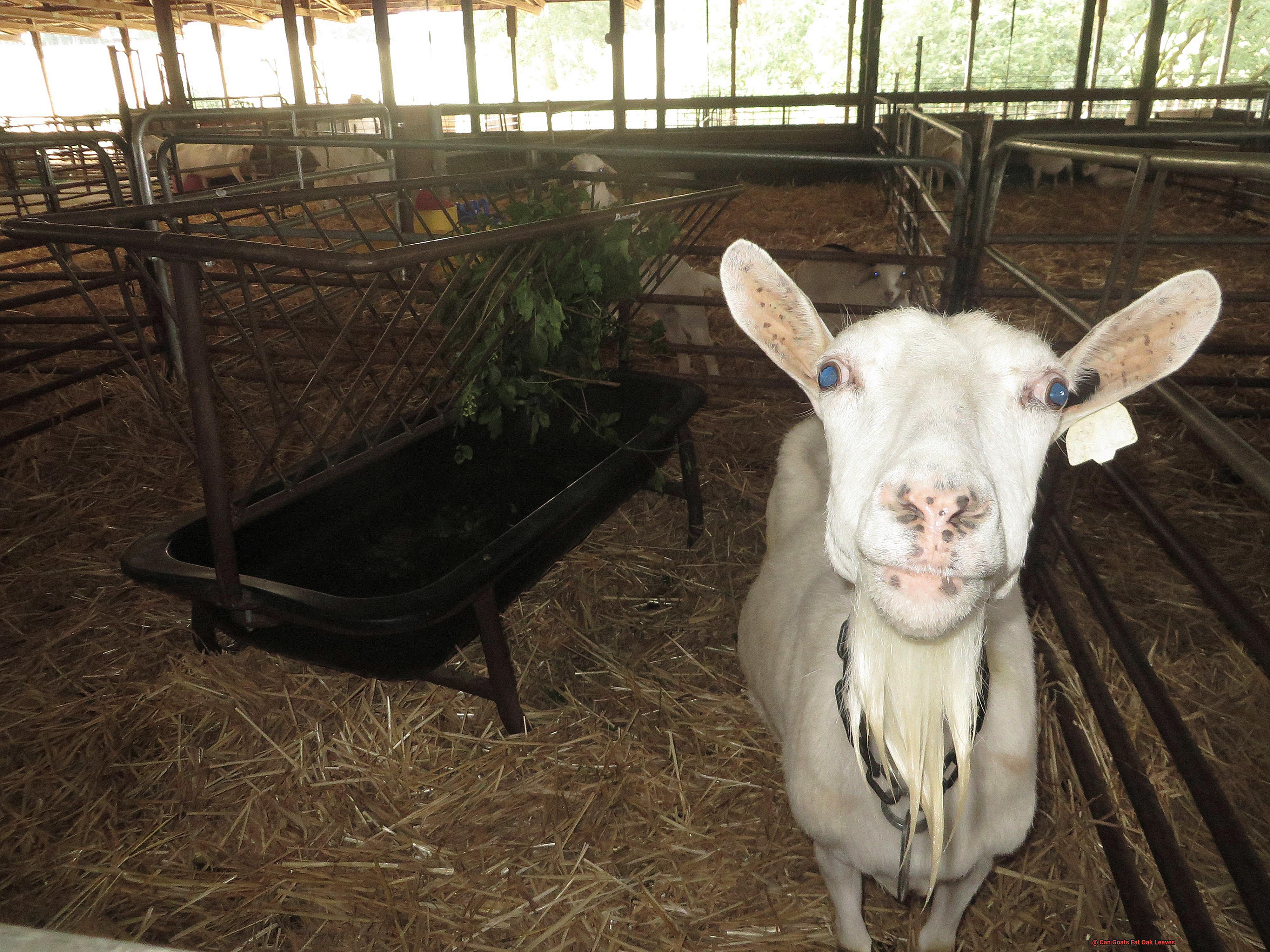
Get ready to learn all about the fascinating world of goats and oak leaves.
What are Oak Leaves?
Contents
Oak leaves are not just any ordinary leaves – they are the beautiful green foliage that grows specifically on oak trees. These leaves have a unique shape with multiple lobes that make them easily identifiable. Oak trees are prevalent in many parts of the world, including North America, Europe, and Asia. These leaves are often used for decorative purposes, such as in wreaths or other crafts.
Aside from being ornamental, oak leaves are also essential food sources for many animals. However, not all animals can safely consume oak leaves. In fact, some animals may experience negative health effects if they eat too many oak leaves.
One thing to note is that oak leaves contain tannins, which are organic substances that give them their bitter taste. Tannins can interfere with the absorption of nutrients in an animal’s digestive system, leading to malnutrition or other health problems. This is especially true for goats who are particularly sensitive to tannins.
As a goat owner, it is crucial to monitor what your goats eat as consuming too many oak leaves can cause gastrointestinal problems such as diarrhea and constipation. It can even lead to kidney damage and be fatal in extreme cases. Not all oak trees produce the same amount of tannin, and the age of the leaves and tree can also affect the levels of tannin present. Younger oak leaves tend to have higher levels of tannin than older leaves, and newer growth on the tree will have higher levels of tannin than older growth.
Thus, before allowing your goats to eat oak leaves, it’s essential to research what kind of oak tree is present in your area and whether or not it’s safe for your goats to consume. Monitoring how much your goats are eating and their overall health after consuming oak leaves is critical.
Are Oak Leaves Safe for Goats?
As someone who is knowledgeable about goat nutrition, I often receive inquiries about the safety of feeding oak leaves to these animals. Unfortunately, the answer is not a straightforward one. While oak leaves may be attractive and easy to come by, they can pose significant risks to your goat’s health if consumed in large quantities.
Oak leaves contain tannins and other toxins that can interfere with the digestive system of goats. These compounds bind to proteins and enzymes in the stomach and intestines, resulting in a decrease in nutrient absorption and potential digestive problems. Moreover, oak leaves have high levels of insoluble fiber, which can cause bloating and constipation.
However, if you dry and store oak leaves properly, small amounts may be safe for goats to consume. This is because the drying process reduces the tannin levels in the leaves. It is important to note that different species of oak trees have varying levels of toxicity. As such, it’s best to consult with a veterinarian or animal health professional before feeding oak leaves to your goats.
As a responsible goat owner, it is crucial to keep a close eye on what your animals eat and ensure that they have access to a balanced diet of hay, grass, and other safe plant materials. Clean water must also be available at all times. If you suspect that your goat has eaten too many oak leaves or is displaying signs of digestive distress like diarrhea, bloating, or constipation, seek veterinary attention immediately.
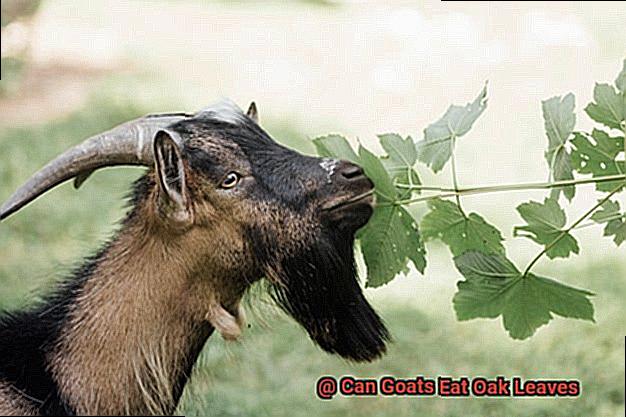
In conclusion, it’s best to avoid feeding oak leaves to your goats altogether. If you must feed them oak leaves, take necessary precautions such as proper drying and storage and consulting with a veterinarian.
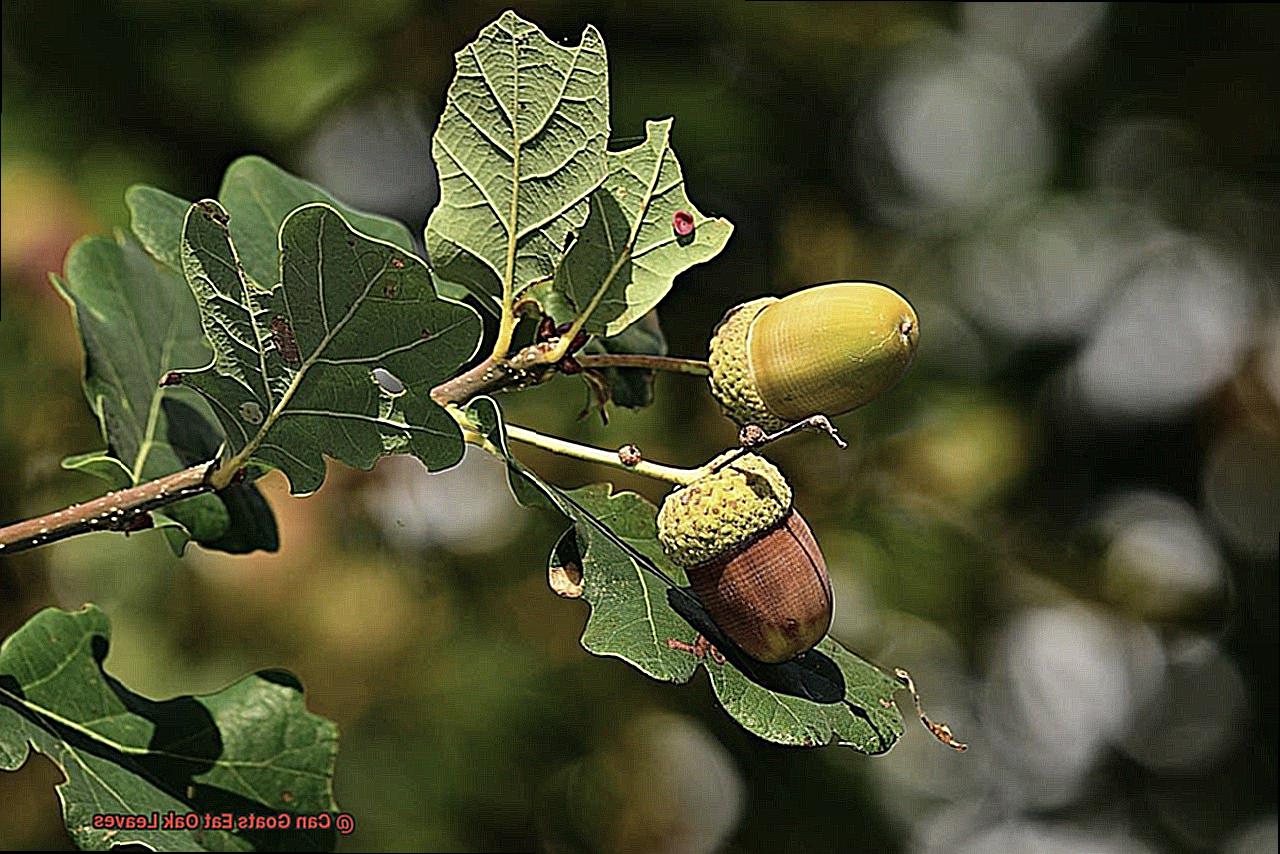
The Risks of Eating Oak Leaves
Today, we’ll be delving into a topic that’s often overlooked but incredibly important – the risks of feeding goats oak leaves. As someone who’s passionate about goat nutrition, I cannot stress enough how crucial it is to be mindful of what your goats eat.

Oak leaves, while seemingly harmless, contain tannins that can be toxic if consumed in large quantities. These pesky tannins can cause digestive upset, kidney damage, and in severe cases, even death. But wait, there’s more. Oak leaves also contain gallotannins, quercetin, and cyanogenic glycosides – compounds that can damage your goats’ liver and kidneys.
If all that wasn’t enough to convince you to steer clear of oak leaves, here’s another reason – they may be contaminated with pesticides or herbicides used to treat the trees. These chemicals can wreak havoc on your goats’ health and cause serious problems.
So what can you do to keep your goats safe? Firstly, keep them away from oak trees and any fallen leaves or branches. If you have oak trees on your property, make sure to fence them off or remove them altogether. And don’t forget to provide your goats with a well-balanced diet that meets their nutritional needs to prevent them from seeking out harmful plants like oak leaves.
I know it can be tempting to give your goats a little treat every now and then, but when it comes to their safety, it’s better to err on the side of caution. Remember, prevention is always better than cure.
In conclusion, as responsible goat owners, it’s our duty to ensure that our furry friends stay healthy and happy. By being aware of the risks associated with feeding oak leaves to goats and taking necessary precautions, we can help ensure that our goats live long and fulfilling lives.
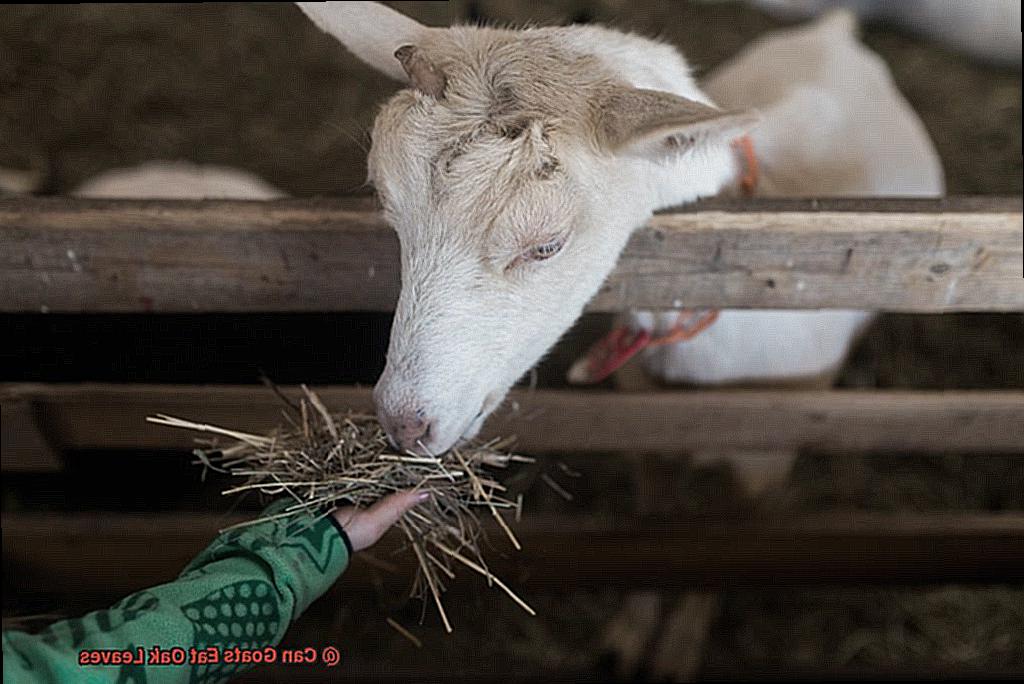
How to Identify Safe Oak Trees
Goats are notorious for nibbling on anything and everything. However, when it comes to oak leaves, it’s crucial to make sure that your furry friends are safe. Oak trees produce a compound called tannin, which can be harmful to goats if consumed in large quantities. To keep your goats healthy and happy, it’s essential to know how to identify safe oak trees for them to munch on.
Know the Different Species
The first step in identifying safe oak trees is knowing the different species. Red oak, black oak, and pin oak trees have high levels of tannins and can be toxic to goats. On the other hand, white oak trees are considered safe for goats to consume. So, if you see a white oak tree in your yard, let your goats go wild.
Examine the Leaves
Another way to identify safe oak trees is by examining their leaves. Safe oak leaves should be light green in color and have a smooth texture. Toxic oak leaves are typically darker in color and have a rough texture with pointed edges. So, before you let your goats graze on any oak leaves, make sure they match the characteristics of safe leaves.
Consider the Age of the Leaves
It’s also important to note that young oak leaves are generally safer for goats to consume than mature leaves. This is because mature leaves contain higher levels of tannins, which can be harmful to goats. So, if you’re unsure about the age of the leaves, opt for younger ones just to be safe.
Monitor the Amount Consumed
Once you’ve identified a safe oak tree and its leaves, it’s crucial to monitor the amount of oak leaves your goats consume. While safe in moderation, too many oak leaves can cause digestive issues and even kidney damage in goats due to their high levels of tannins. So, make sure that your goats don’t overindulge in their favorite snack.
Err on the Side of Caution
In conclusion, feeding your goats oak leaves requires careful consideration and knowledge of how to identify safe trees. By following these tips and taking precautionary measures, you can ensure that your goats safely enjoy their snacks from the oak tree without any health concerns. Remember, when in doubt, always err on the side of caution and avoid feeding your goats oak leaves altogether.
Overall, identifying safe oak trees for your goats to consume requires careful examination of the tree species and leaf characteristics. By taking these precautions, you can ensure that your goats safely enjoy their snacks from the oak tree.
How Much Oak Leaves Can Goats Eat?
Oak leaves contain tannins that can cause kidney damage and other health problems in goats if ingested in large quantities.
So, how much is too much? As a general rule, it’s best to avoid letting your goats graze on oak trees or consume large amounts of oak leaves. However, a few oak leaves as an occasional treat shouldn’t cause any harm.
It’s worth noting that the toxicity of oak leaves can vary depending on the species of oak tree. Some species, like white oaks, contain lower levels of tannins and may be safer for goats to consume in small amounts. On the other hand, red oaks have much higher levels of tannins and should be avoided entirely.
If you’re unsure about the safety of feeding oak leaves to your goats, it’s always best to consult with a veterinarian or experienced goat owner. Your goats’ health and well-being should always be top priority.

Monitoring Your Goats After Eating Oak Leaves
The tannins in oak leaves can cause kidney damage and toxicity if consumed in large quantities. So, what should you do if your goats have eaten oak leaves? Let’s explore the steps you can take to monitor your goats after they have consumed oak leaves.
First and foremost, it’s crucial to keep a watchful eye on your goats’ behavior and appetite. If they are acting differently or not eating as much as usual, it could indicate toxicity. Keep track of any physical symptoms like diarrhea or vomiting.
If you suspect that your goats have consumed too many oak leaves and are experiencing symptoms of toxicity, don’t hesitate to contact your veterinarian right away. They can provide medication to help alleviate the symptoms and prevent further damage.
But the best way to protect your goats is by preventing access to oak trees or fallen leaves in the first place. Consider fencing off areas where oak trees grow or removing fallen leaves from their pasture. Offering alternative sources of food such as hay or fresh vegetables can also discourage goats from eating oak leaves.
Monitoring your goats after they have eaten oak leaves is essential for their health and well-being. Keeping an eye on their behavior and appetite and seeking veterinary attention if necessary can help prevent serious illness or even death.
3fplnXNYs9k” >
Conclusion
In conclusion, the question of whether goats can eat oak leaves is not a simple one to answer. It’s better to err on the side of caution and avoid feeding oak leaves to goats altogether. Oak leaves contain tannins that can be toxic in high amounts and cause digestive problems, kidney damage, and even death in severe cases. However, if you must feed your goats oak leaves, it’s important to take necessary precautions such as proper drying and storage and consulting with a veterinarian.
Identifying safe oak trees for your goats requires careful examination of the tree species and leaf characteristics. Safe oak leaves should be light green in color, have a smooth texture, and come from white oaks rather than red oaks or black oaks. Monitoring how much your goats are eating is also crucial as consuming too many oak leaves can cause gastrointestinal problems.
If you suspect that your goat has eaten too many oak leaves or is displaying signs of digestive distress like diarrhea or constipation, seek veterinary attention immediately. Remember that prevention is always better than cure when it comes to keeping your furry friends safe and healthy.
As responsible goat owners, we must ensure that our goats have access to a balanced diet of hay, grass, and other safe plant materials. By being aware of the risks associated with feeding oak leaves to goats and taking necessary precautions, we can help ensure that our goats live long and fulfilling lives.

